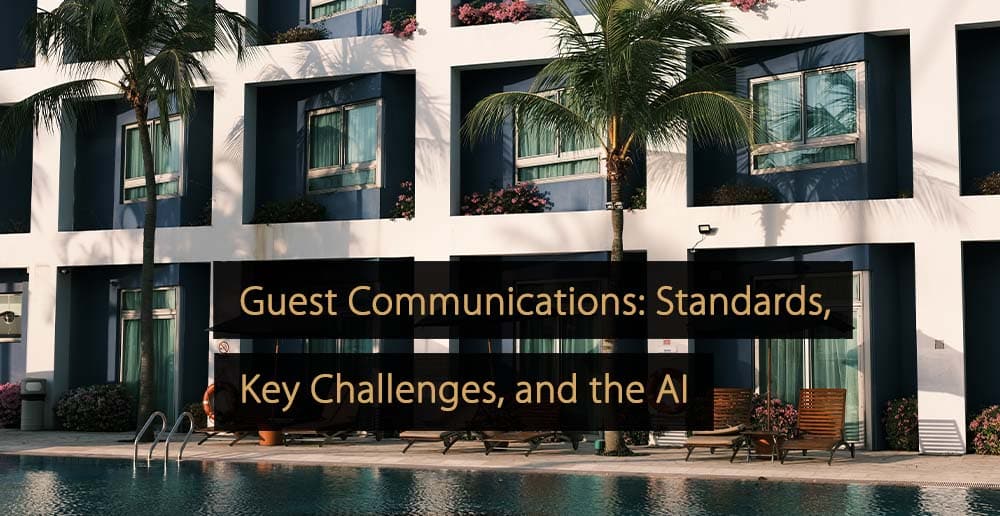Time and effort going into answering guest queries should not be underestimated. How to optimize the process to benefit your guests and your staff? This article explores how hotel tech solutions powered by artificial intelligence (AI) can help you do that. Still, first, it outlines the reasons behind the high volume of guest questions, the value of achieving the gold standard in responding to them, and the challenges hoteliers face to succeed in that area.
Questions About Everything, on Every Channel, on Repeat
Ask any member of your reservations, front office, or social media teams about the type and volume of questions they receive daily, and you’ll quickly get the picture of how overwhelming replying to them all can be.
There is a constant flow of incoming queries across all communication channels your hotels operate – phone calls, emails, website forms, live chats, social media, instant messaging apps, and in-person at the reception desk. It’s also not uncommon for guests to send the same question across multiple channels if they don’t receive an immediate response, resulting in duplicates of already answered questions unnecessarily adding to the workload.
Then, there is also the range of questions. Your staff can probably answer the hotel’s top FAQs (frequently asked questions) in their sleep due to the countless times they had to provide the answer. Responding to repetitive questions can quickly become a tedious task, affecting your team’s job satisfaction and motivation, which is a risk you want to avoid considering staff shortages in the travel and hospitality industry. On the flip side, some questions are very specific and need to be relayed to other departments, impacting the response time.
Top 10 Reasons Why Guests Ask Questions
- Missing information (or information overload) – the most straightforward situation when sought-after information doesn’t appear on the website or is difficult to find amongst all other details.
- Information discrepancy across different platforms – some details regarding available amenities and facilities may differ from one platform to another, e.g., a hotel website and an OTA platform, leading to prospective guests requesting necessary details to compare the offers available.
- Clarifications – especially when certain details are important to the incoming guests, they may wish to have extra reassurance before booking.
- Language barriers – similarly to the clarifications, guests from abroad who are not fluent in the languages available on your hotel’s website may request explanations or reassurance in terms that are easier for them to understand.
- Special requests – from surprises for their travel companions to making accessibility arrangements, interested guests may want to ensure your hotel can accommodate their needs.
- Changing plans/Cancellations – even though you may provide relevant information about managing bookings upon reservation, in potentially stressful situations, travelers may want to be reassured individually that the changes to their original plans can be accommodated.
- Special deals – if your hotel runs promotions and seasonal offers, you will likely receive follow-up questions from interested guests.
- Complaints and feedback – during or after their stay, guests may want you to acknowledge and address their concerns or share an appreciation of your staff’s service.
- Tips and recommendations – taking advantage of your hotel brand’s hospitality, guests may ask you for advice on making the most of their time in the area and undoubtedly appreciate personalized suggestions leading up to or during their stay.
- Support with processes – some guests may need assistance with online bookings and other services you provide digitally.
Does Every Question Need to be Answered?
Considering the volume of incoming questions and limited human resources to manage them and respond, it is increasingly more challenging for hotels to stay on top of guest communications. However, it is important not to remember that behind every question, there is a potential for a completed (direct) booking, improved guest experience resulting in a positive review, nurturing guest loyalty, and other benefits that, one way or another, are linked to increased revenue.
Gold Standards in Guest Communications
Providing an answer is the minimum, but there are a few factors that make a difference between a satisfactory experience and an excellent one:
- Response time. An important metric in guest communications. The sooner (prospective) guests receive an answer, the more likely they are to, for example, make a reservation or have their experience at your hotel improved.
- Helpful attitude. Even though it may not always be possible to fully answer and resolve each query, showing professionalism and goodwill can leave guests with a good impression, which can be enough for them to develop trust and confidence in your hotel brand.
- Precise and accurate answers. When responding to questions, focus on providing concise information directly related to the essence of the query upfront. Often, that’s all the guests need. However, providing additional helpful information leads to another point:
- If you have any data about the guests or their interest in specific areas of your service, use it to personalize your communications. Be it a mention of a co-working space for business travelers, a list of children’s activities for incoming families, or anything relevant that can make the guests feel looked after.
- Queries from the same guests may often end up in various inboxes across your communication channels, so ensure your staff has a central knowledge base to ensure answers have the same content and depth every time.
Then Why Do Some Questions Remain Unanswered?
Most hoteliers understand the value of quickly responding to the queries they receive, but the execution of that strategy is no easy feat due to the following factors:
- The overwhelming number of incoming questions,
- The number of communication channels to manage,
- Staff shortages in the industry,
- Language barriers,
- Lack of a centralized knowledge base for staff.
Where Can Conversational AI Really Help?
Considering the high standards in guest communications and the challenges in achieving them, hoteliers may be interested in hotel tech solutions available on the market. Developments in artificial intelligence (AI), especially conversational AI and generative AI (e.g., ChatGPT), were frequent items in the news cycle and public discourse in 2023. In fact, hotel guests have already embraced conversational AI.
There is a specialized niche of providers of AI-powered solutions explicitly developed for hospitality that can help you to:
- Streamline guest communications – bring messages from various channels into a single inbox and even automatically detect and combine queries from the same people to avoid duplicates.
- Automate responding to queries – conversational AI can respond to most FAQs instantly, 24/7, in over 130 languages. One of the leading AI-powered solutions developed by HiJiffy reports resolving, on average, over 85% of incoming queries independently, i.e., without the need for hotel staff’s involvement.
- Boost direct bookings and revenue from upselling – AI-powered assistants can guide you throughout the booking process and offer relevant, personalized upselling offers, increasing the conversation rate and, ultimately, the revenue.
- Automate processes – conversational AI integrated with property management systems (PMS) can facilitate digital check-in and check-out processes.
Conversational AI has proved to be a reliable technology that revolutionizes guest communications by leaving no questions unanswered, ensuring rapid and consistent responses, boosting guest satisfaction, and generating more hotel revenue. At the same time, it reduces the workload for your hotel staff, making them available to resolve tasks that benefit the most from the human touch.
More Tips to Grow Your Business
Revfine.com is the leading knowledge platform for the hospitality and travel industry. Professionals use our insights, strategies, and actionable tips to get inspired, optimize revenue, innovate processes, and improve customer experience.Explore expert advice on management, marketing, revenue management, operations, software, and technology in our dedicated Hotel, Hospitality, and Travel & Tourism categories.








Leave A Comment